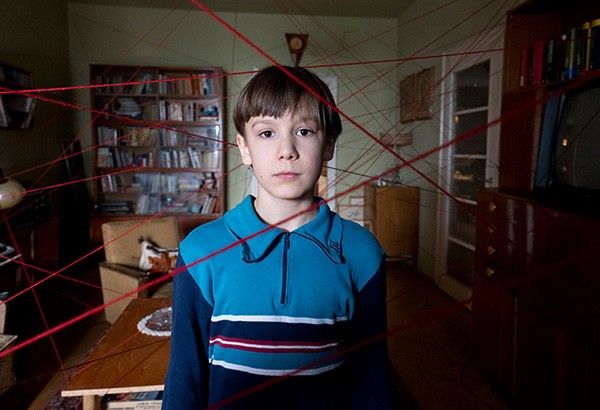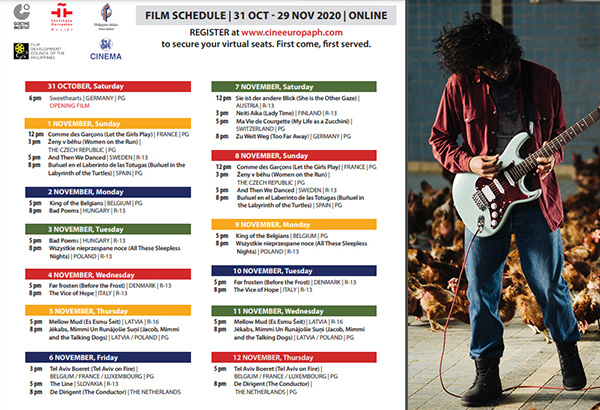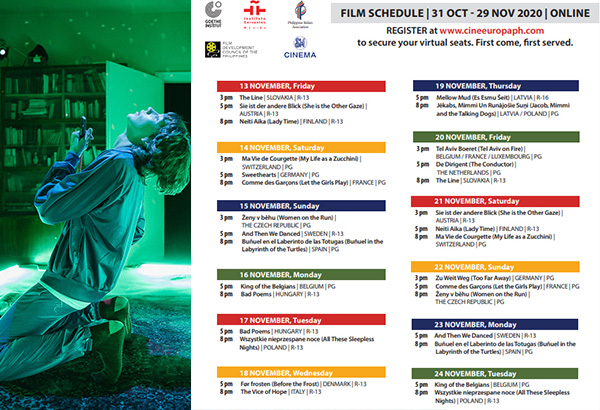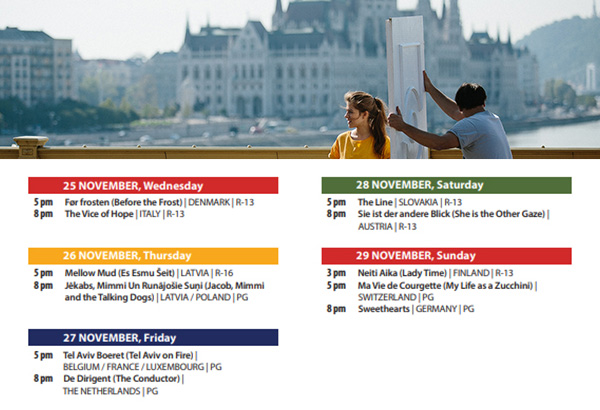LIST: Cine Europa 2020 schedule, trailers, synopses

MANILA, Philippines — Cine Europa, Europe’s biggest film festival, is now back in the Philippines from October 31 to November 29.
The pandemic is not about to stop the film festival but in effect has provided an occasion to turn a challenge into an opportunity.
This year, Cine Europa brings 19 films from 20 European countries for 30 days and are accessible right at the click of your fingertips upon signing up at www.cineeuropaph.com.
A unique feature in this 23rd edition of the film festival is that we are using Festival Scope, the EU’s library of quality films, this will allow us to show films from countries not represented in the Philippines. The roster of films adds up to those individually provided by European embassies in Manila.
Despite the virtual environment, Cine Europa will maintain its strong relations with its loyal patrons including those from the various provinces across the country.
The EU Delegation, the European Union member states embassies and Embassy of Switzerland, cultural institutes including Goethe-Institut, Instituto Cervantes Manila, Philippine-Italian Association, continue to value the support of the Filipino moviegoing public and have endeavoured to curate a sample of films showing the diversity of the European film industry.
The German film, “Sweethearts,” is set to launch Cine Europa on 31 October at 6:30 p.m. The comic-thriller, directed by Karoline Herfurth, is about a professional criminal Mel and her easily-panicked hostage Fanny. Forced together by fate and an ill-executed diamond robbery, the couple is trapped in a race against time. Soon pursued by a relentless detective and the greedy Berlin underworld, they are left with no other choice than to work together.
WATCH: 'Sweethearts' trailer
Special features
Cine Europa 23 shall feature three animated films for families and children. These value-laden films are expected to share lessons, which all viewers can relate with. European culture is not very different with Philippine traditions that is why Cine Europa’s audiences will definitely enjoy and see the commonalities between the two regions.
The usual educational component of Cine Europa continues this year as professional speakers are expected to share and engage with Filipino cinephiles in various subjects ranging from directing, producing and promoting film masterpieces.
Rafael de Bustamante, First Counsellor of the EU Delegation to the Philippines, said that Cine Europa aims at exposing the Filipino public to films which rarely make it to the commercial theaters. Cine Europa also wants to increase cooperation between, our creative industries and to maximize reach by the use of new platforms.
This year’s film festival will be presented to media on 30 October with Mr Bustamante along with Ms Liza Dino, Chairperson of the Film Development Council of the Philippines, and ambassadors and cultural attaches of the EU member states’ embassies and cultural institutes.
Bustamante said that the “celebration of the cultural partnership between the EU and the Philippines continues with Cine Europa which is getting bigger every year."
“The EU wants to sustain its tradition of providing highly-acclaimed European films to the Filipino moviegoers."
The values of love, hope, friendship, family, courage, strength and perseverance cut across all cultures whether in the European or in the Filipino context, said Bustamante.
Schedule



Synopses
'Bad Poems' (Hungary)
The 33-year-old Tamás Merthner is heartbroken, after his girlfriend Anna, who is on a scholarship in Paris, breaks up with him. While wallowing in self-pity, Tamás takes a trip down memory lane to figure out if love only exists when it's practically gone. As he is trying to pick up the pieces, he begins to realize what makes this current society so confused, which gives us a highly subjective view of Hungary's present.
'All These Sleepless Nights' (Poland)
A new era is coming, and Warsaw stands uncomfortably at its edge. Art school classmates Christopher and Michal, on the precipice of their own coming of age, restlessly roam the city’s streets in search of living forever inside the beautiful moment. Never content with answers, they push each experience to its breaking point, testing what it might mean to be truly awake in a world that seems satisfied to be asleep.
'Before the Frost' (Denmark)
As winter approaches in rural 1850s Denmark, an old farmer (Jens) and his family face starvation. With the harsh circumstances and the prospect of yet another tough winter, Jens agrees to ally with the neighbor family in a marriage between his daughter and their son. However, when the rich farmer at a nearby farm wants to buy Jens’s land, he sees a chance to provide him and his family with an even better life.
'The Conductor' (The Netherlands)
The film “The Conductor” is based on the true story of the Dutch-born Antonia Brico. In the late 1920s, she was the world’s first woman who successfully conducted a large symphony orchestra. Until recent, women barely succeeded to reach the world’s top ranking conductors. This year, for the first time in Dutch history, the Netherlands Radio Philharmonic Orchestra appointed a woman as its Chief Conductor: Karina Canellakis.
'She is the Other Gaze' (Austria)
Christiana Perschon’s documentary “She is The Other Gaze” presents a series of interviews with five female visual artists: Renate Bertlmann, Linda Christanell, Lore Heuermann, Karin Mack, Margot Pilz. Most of these artists started their careers in the 1970s, in Vienna, and the film explores the relation between their practice and feminism. As we see them working, performing in front of the camera or commenting on some of their pieces, they recall the difficulties, constraints and resistances encountered at the beginning of their paths. She is
the other gaze has a unified tone (minimalist, drenched in white, without music), while building each segment as a particular collaboration between the artist and the filmmaker, in an intergenerational dialogue whose traces are visible on screen. Equally, each one of the artists featured has a unique approach, a specific artistic vision, but their trajectories have all been informed, in one way or another, by women’s issues: the fight against patriarchal structures, the lack of visibility, an intimate relation to the objects of everyday domesticity, the difficulties in negotiating family life and artistic ambitions.
'My Life as a Zucchini' (Switzerland)
After losing his mother, a young boy is sent to a foster home with other orphans his age where he begins to learn the meaning of trust and true love.
'Too Far Away' (Germany)
A bullied 12-year-old boy bonds over soccer with an 11-year-old, new in town, a Syrian refugee.
'Let the Girls Play' (France)
Reims, 1969. Paul Coutard, inveterate seducer and sports journalist for the daily Le Champenois, decides to organize a women's football match to challenge his director at the newspaper's annual fair. His best enemy, Emmanuelle Bruno, executive secretary, finds himself obliged to assist him. Without knowing it, they will embark together in the creation of the first female football team in France.
'King of The Belgians' (Belgium)
Desperate to return home from a state visit to Istanbul when his country suffers its worst-ever political crisis, but unable to fly due to a solar storm, the King of the Belgians finds himself on a tumultuous road trip across the Balkans.
'Buñuel in the Labyrinth of the Turtles' (Spain)
Paris, 1930. Salvador Dali and Luis Buñuel are the principal figures of the surrealist movement, but Buñuel sees how all doors seem to have closed after the scandalous premiere of “The Golden Age”, his first film. However, his sculptor friend, Ramon Acin, buys a lottery ticket with a promise that, should he win, he will pay the documentary that his friend would like to film about Las Hurdes, one of the poorest and forgotten regions of Spain… Depicts the filming in the Extremadura región of Las Hurdes by the master Luis Buñuel, of the 1933 film “Land Without Bread.”
'And Then We Danced' (Sweden)
Merab has been training since a young age at the National Georgian Ensemble with his dance partner Mary. His world is suddenly turned upside down when the charismatic and carefree Irakli arrives and becomes both his strongest rival and desire. In this conservative setting Merab finds himself having to break free and risk it all.
'Jacob, Mimmi, and the Talking Dogs' (Latvia / Poland)
Merab has been training since a young age at the National Georgian Ensemble with his dance partner Mary. His world is suddenly turned upside down when the charismatic and carefree Irakli arrives and becomes both his strongest rival and desire. In this conservative setting Merab finds himself having to break free and risk it all.
'Vice of Hope' (Italy)
The story of a difficult birth set against the backdrop of child trafficking in Castel Volturo, an area outside Naples known for being the most lawless area in Italy.
'Mellow Mud' (Latvia)
Abandoned by their mother and stuck in a miserable living situation, 17-year-old Raya and her adolescent brother Robis must decide between an orphanage or the guardianship of their grandmother, whom they despise.
'Tel Aviv on Fire' (Belgium, Luxembourg, France)
Two people meet again after more than 40 years. Once they were lovers but their live took different paths: she married his best friend; he married another woman. Now, they are both single again and fall in love for a second time. Is it possible to experience a love you left 40 years ago?
'The Line' (Slovakia)
There are borders you cross only once… This is a criminal thriller about traffickers and smugglers from Ukrainian border. The feature film about the borders and the life on
their edge.
'Lady Time' (Finland)
Sirkka-Liisa died alone with no one left to miss her. Elina happened to buy her home after her death and ended up with all Sirkka-Liisa’s possessions from books to photos. What would happen if Elina threw all her things away?
'Women on the Run' (Czech Republic)
Vera has lived a wonderful life with Jindrich, and she is fully determined to fulfill his last wish – running a marathon! The spirited mother of three daughters doesn’t think that doing so will be a problem. She and her daughters will split up the route into four parts, and they’ll overcome the over 42-kilometer-long challenge as a family relay team. Of course, the fact that neither of them has ever ran even a meter poses no problem. There’s three months left until the start, and trainer Votja has prepared a great fitness plan. The daughters aren’t rushing to start running, however. They’re dealing with a different sort of problems altogether. What applies to running applies to life as well. It’s important to persevere and not give up when the finish line is just beyond reach.
- Latest
- Trending
































